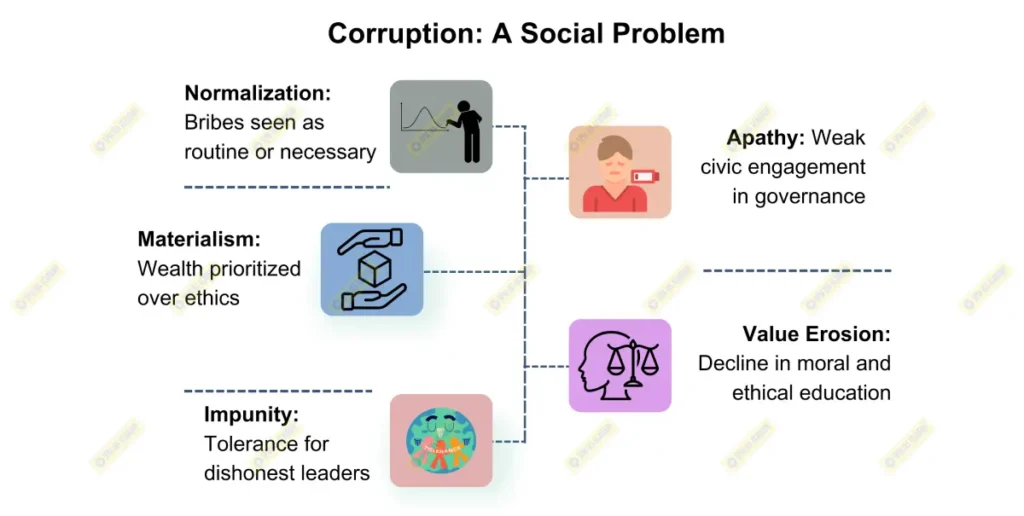Corruption, as a violation of integrity and accountability, undermines public trust and hampers governance. While legal frameworks address corruption through punitive measures, its persistence indicates deeper social and systemic roots, including normalization of unethical behavior, socio-economic disparities, and institutional weaknesses. Mahatma Gandhi rightly observed, “The world suffers a lot, not because of the violence of bad people, but because of the silence of good people.” This highlights that tackling corruption requires a combination of legal deterrents and societal transformation.
Corruption as a Social Problem

- Cultural Normalization
○ Corruption often stems from the acceptance of unethical practices like bribery, nepotism, and favoritism as normal.
○ Example: A recent study by Transparency International found that over 50% of Indian citizens believe paying bribes is essential to accessing public services. - Socio-Economic Inequality
○ Poverty and unemployment create conditions where individuals resort to corrupt practices for survival or advancement.
○ John Rawls’ Theory of Justice: Inequitable systems perpetuate unfairness, incentivizing corruption at all levels. - Weak Civic Responsibility
○ Lack of public awareness and engagement undermines accountability. Citizens often fail to demand transparency, enabling corrupt practices.
○ Example: Poor utilization of tools like the Right to Information (RTI) indicates low civic participation in anti-corruption efforts. - Institutional Challenges
○ Complex bureaucratic systems and excessive red tape create opportunities for corruption by delaying services or approvals.
○ Santhanam Committee (1964): Identified administrative inefficiency as a breeding ground for corruption. - Societal Pressures
○ Cultural emphasis on material success and societal pressures to maintain status lead to unethical means of income generation.

Legal Framework and Government Steps to Reduce Corruption
1. Amendments to the Prevention of Corruption Act (PCA), 2018
- Criminalizes both bribe-taking and giving, with enhanced penalties.
- Introduces safeguards for honest officials by requiring prior government approval for prosecuting public servants.
- Encourages time-bound trials to ensure faster justice.
2. Digital Governance
- Platforms like Government e-Marketplace (GeM) and Direct Benefit Transfer (DBT) eliminate middlemen, reducing opportunities for corruption.
- Example: DBT saved over ₹2.23 lakh crore by preventing leakages in subsidy distribution.
3. Strengthening Whistleblower Mechanisms
- Protection under the Whistle Blowers Protection Act, 2014 encourages reporting of corruption.
4. Transparency Initiatives
- Right to Information Act, 2005 empowers citizens to hold public officials accountable.
- Example: RTI played a pivotal role in exposing scams like the Adarsh Housing Society Scam.
5. Institutional Reforms
- Lokpal and Lokayuktas Act, 2013 established an independent ombudsman to investigate corruption cases.
- Recommendations by the Second Administrative Reforms Commission (ARC) emphasized e-governance, simplification of procedures, and citizen charters.
6. Vigilance and Anti-Corruption Drives
- Central Vigilance Commission (CVC) oversees corruption cases in public administration.
- Example: Regular vigilance awareness weeks by CVC enhance organizational accountability.
Will the PCA Amendments Help Honest Officials?
- Safeguarding Honest Officials
○ Prior government approval for prosecution reduces harassment of honest officers.
○ Example: Fear of false accusations previously deterred officials from making bold, ethical decisions. - Time-Bound Trials
○ Speedier trials ensure justice delivery without prolonged uncertainty, enhancing officials’ confidence. - Challenges Remain
○ Approval mechanisms might delay genuine cases.
○ Whistleblower protection needs further strengthening to safeguard honest individuals exposing corruption.
Corruption is as much a social problem as a legal one, rooted in systemic inequities, cultural norms, and institutional inefficiencies. While legal measures like the PCA amendments, RTI, and e-governance are steps in the right direction, they must be complemented by ethical education, civic awareness, and socio-economic reforms to achieve long-term impact. As Mahatma Gandhi emphasized, “Be the change you wish to see in the world,” citizens and institutions alike must actively participate in fostering a culture of integrity and accountability.











